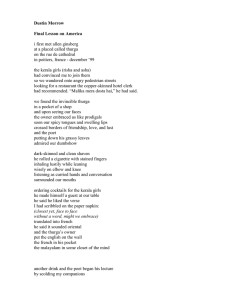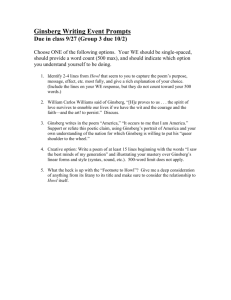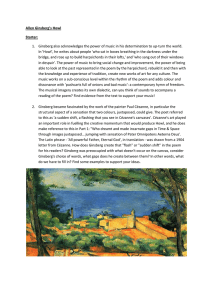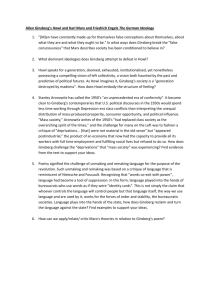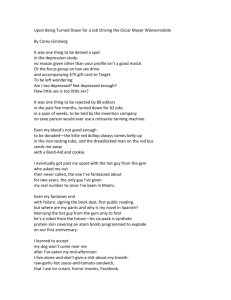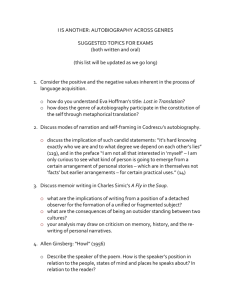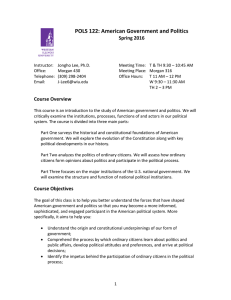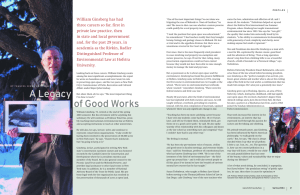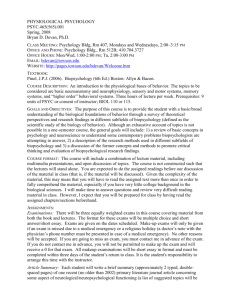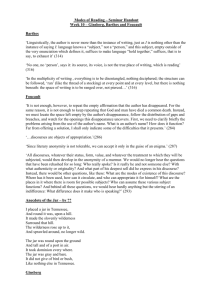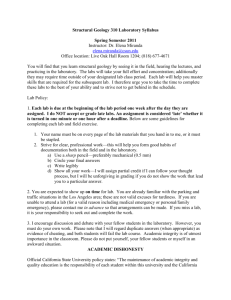POLITICAL SCIENCE 101
advertisement
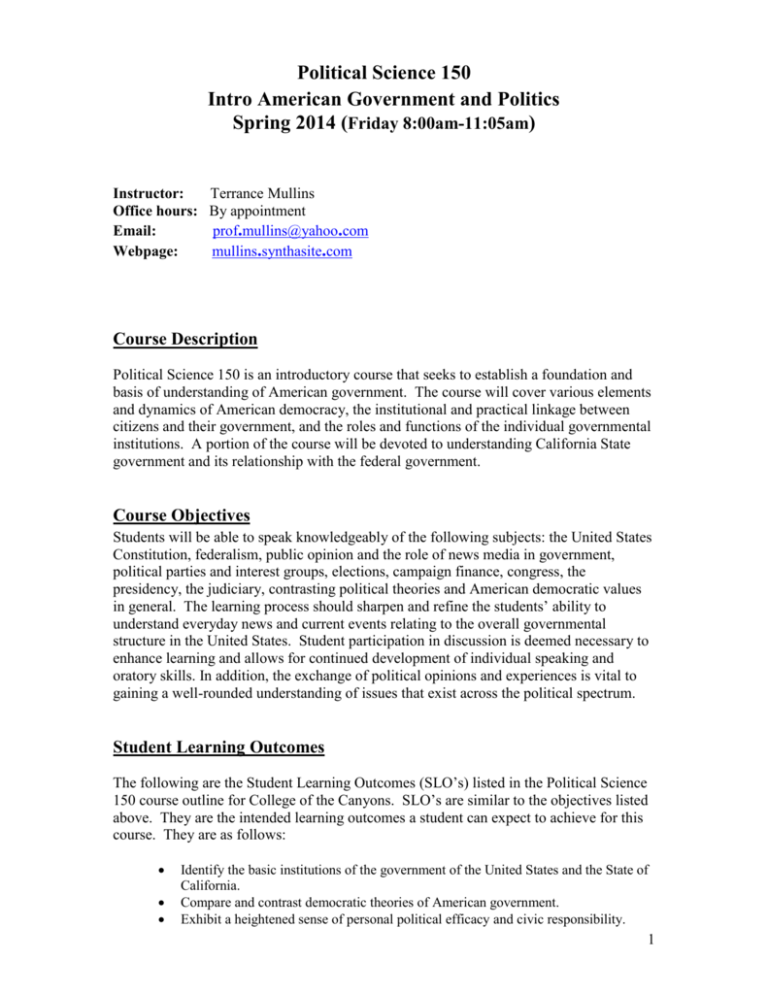
Political Science 150 Intro American Government and Politics Spring 2014 (Friday 8:00am-11:05am) Instructor: Office hours: Email: Webpage: Terrance Mullins By appointment prof.mullins@yahoo.com mullins.synthasite.com Course Description Political Science 150 is an introductory course that seeks to establish a foundation and basis of understanding of American government. The course will cover various elements and dynamics of American democracy, the institutional and practical linkage between citizens and their government, and the roles and functions of the individual governmental institutions. A portion of the course will be devoted to understanding California State government and its relationship with the federal government. Course Objectives Students will be able to speak knowledgeably of the following subjects: the United States Constitution, federalism, public opinion and the role of news media in government, political parties and interest groups, elections, campaign finance, congress, the presidency, the judiciary, contrasting political theories and American democratic values in general. The learning process should sharpen and refine the students’ ability to understand everyday news and current events relating to the overall governmental structure in the United States. Student participation in discussion is deemed necessary to enhance learning and allows for continued development of individual speaking and oratory skills. In addition, the exchange of political opinions and experiences is vital to gaining a well-rounded understanding of issues that exist across the political spectrum. Student Learning Outcomes The following are the Student Learning Outcomes (SLO’s) listed in the Political Science 150 course outline for College of the Canyons. SLO’s are similar to the objectives listed above. They are the intended learning outcomes a student can expect to achieve for this course. They are as follows: Identify the basic institutions of the government of the United States and the State of California. Compare and contrast democratic theories of American government. Exhibit a heightened sense of personal political efficacy and civic responsibility. 1 Textbooks: 1. We the People, An Introduction to American Government by Benjamin Ginsberg, Theodore Lowi, Margaret Weir (Norton) 2. Governing California by Theodore Anagnoson, et al (Norton) Student Responsibilities Electronic Devices: Turn off **ALL** cell-phones (no vibrate mode--shut it down completely), laptops, and other electronic devices and put them away. Students who engage in “TEXTING” during lecture will be instructed to leave immediately. Emailing the professor: Always include the following information when emailing me: Your full name Class section (i.e. POL 150 TWTh 8:0am) Attendance: Scheduling appointments or other activities during class time is not acceptable. It is your responsibility to withdraw from the class if need be. It is your responsibility to attain the lecture notes from a fellow student if you miss a class meeting. Participation: The class will be divided between lectures and group/class discussions, debates, and role-plays. All students will be required to participate to the best of their ability. You must be courteous at all times and respect the opinions of others, even if they differ from your own. Reading: Review the class syllabus and the course schedule weekly. You are responsible for reading the entire assignment before class. Careful reading of assignments BEFORE class meetings will allow us to have a two-way discussion about the context and implications of the facts, instead of simply listening to a lecture concerning the facts. Students with disabilities: If you have a documented disability and wish to discuss academic accommodations, please contact me as soon as possible. All accommodations are subject to prior authorization by DSPS and compliance with approved procedures. 2 Grading Policy Grading Policy Grading Scale Midterm Exam #1 ------------------------------------------- 100 points 270 – 300 points = A 90 - 100% Midterm Exam #2 ------------------------------------------- 100 points 240 – 269 points = B Final Exam --------------------------------------------------- 100 points 210 – 239 points = C 70 - 79% 180 – 209 points = D 60 - 69% 000 – 179 points = F 50 - 00% Total = 300 points 80 - 89% Examinations: There will be three in-class examinations (two Midterms and a noncumulative Final Exam) and will include material drawn from the readings, lectures, and any video presentations. The format for the exams will be a combination of Multiple Choice and True or False questions. All exams will be completed using a #882-E Scantron (scantron’s can be purchased from the college bookstore). Study guides are available from the course webpage (mullins.synthasite.com). During the Exam: 1. 2. 3. 4. 5. Students may not have any electronic device on during a test. Students may not leave and return in the middle of a test. Students will not be allowed to wear hats during tests. All in-class examinations are CLOSED BOOK. I DO NOT grade on a curve…what you earn is what you get! Make-up exams will be given for extreme circumstances only and can only receive a maximum of 70 points each. Final Class Grade: I do not give away grades, you earn them!!! An 89% is not an “A” and a 69% is not a “C.” Do not ask me to increase your grade merely because you are “close enough.” 3 Student Code of Conduct I expect you to show your fellow students as well as the instructor common courtesy, and act in a way that is consistent with an educational environment. Students who engage in disruptive behavior during class will be instructed to leave immediately! Examples of disruptive behavior include, but are not limited to, the following: engaging in non-class related conversation with classmates; receiving or answering cellular phone calls in non-emergencies; TEXTING during class; listening to music via an iPod or other media device; studying for another class; using your laptop for anything; being disrespectful of the opinions of others; Academic Integrity Policy College study is the process of becoming an independent scholar. All students are expected to do their OWN work. All forms of cheating and plagiarism will not be tolerated!!! If plagiarism or any other form of academic dishonesty (including cheating on examinations) is suspected, the incident will be thoroughly investigated in accordance with campus policy. Students found cheating or plagiarizing will fail their assignment. Students found to engage in academic dishonesty more than once will be referred to the Office of Judicial Affairs for further administrative action, such as suspension or expulsion. Examples of academic dishonesty include, but are not limited to, the following: Copying, either in part or in whole, from another’s test or examination; Discussion of answers or ideas relating to the answers during an examination or test; Obtaining copies of an exam without the permission of the instructor; Using notes, “Cheat sheets,” or otherwise utilizing information or devices not considered appropriate under the prescribed test conditions; Altering a grade or interfering with the grading procedures in any course; Allowing someone other than the officially enrolled student to represent the same (including signing the sign in sheet for an absent student); Plagiarism, which is defined as the act of taking the ideas, words or specific substantive material of another and offering them as one’s own without giving credit to the source. 4 Note: This syllabus is subject to change at the discretion of the instructor in order to adapt to instructional needs. Course Outline Week Topic Reading Schedule Test & Due Dates 1. Feb. 21 Democracy (Lecture Notes) 2. Feb. 28 U.S. Constitution (Ginsberg Ch. 2, Anagnoson Ch. 2) 3. Mar. 07 Federalism (Ginsberg Ch. 3, Anagnoson Ch. 9) 4. Mar. 14 The Congress (Ginsberg Ch. 9, Anagnoson Ch. 5) 5. Mar. 21 The Presidency (Ginsberg Ch. 10, Anagnoson Ch. 6) 6. Mar. 28 The National Courts (Ginsberg Ch. 12, Anagnoson Ch. 7) EXAM #1 (week 1-5) 7. Apr. 04 8. Apr. 11 9. Apr. 18 Civil Liberties & Civil Rights Spring Break (Ginsberg Ch. 4) Spring Break Public Opinion (Ginsberg Ch. 5) 10. Apr. 25 The Mass Media (Ginsberg Ch. 6) 11. May 02 Political Parties (Lecture Notes) Spring Break EXAM #2 (week 6-10) 12. May 09 Voting & Elections (Lecture Notes) 13. May 16 National Security (Ginsberg Ch. 14) 14. May 23 National Security - cont 15. May 30 Final Exam EXAM #3 (week 11-14) Assignments and test dates may vary from the above schedule. 5
